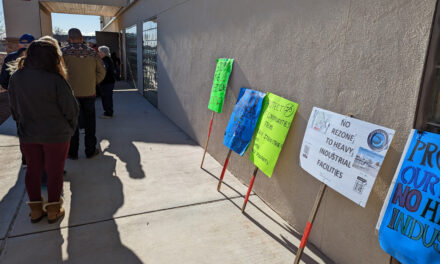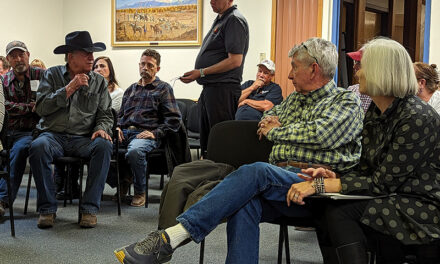Adelino
Jesus Baca watches the gray clouds on the western horizons and prays that they will deliver rain.
The drought has already forced the cattleman to dry-lot some of his cattle, and that’s hard enough on Baca’s potential profit margin.
But now dry-lotting is even more difficult since District Judge James Parker’s decree to stop the irrigation water June 21 to keep water flowing in the Rio Grande to protect the silvery minnow.
Without irrigation water, Baca will not be able to get his third and possibly fourth cut of alfalfa, which he is feeding the cattle in the dry-lot.
“People not involved in agricultural business don’t realize how bad the drought is,” said Baca, who has carried on the ranching and farming operation his grandfather put together. “It’s very expensive to dry lot. You have to grow or buy the hay for the cattle. The drought is even making that difficult now because of the environmental impact it is having on the Rio Grande and the silvery minnow.”
Baca has suffered from the impact of environmentalism for years. He ranches on 50,000 acres of land in the Manzano Mountains and east mesa range of Valencia County — most of it is public land.
“Most ranchers in the state of New Mexico depend on public land,” said Baca, who is on the New Mexico Cattleman’s Association Board. “To hold public land, a rancher does a lot of work to protect that land.”
Running a cattle ranch is not just turning the cattle out to graze and letting them be.
The goal of a rancher running a cow-calf operation, like Baca’s, is to have the right amount of feed and water available to the cow so she will be healthy for calving each year.
“You have to give the cows the attention they need so they will cycle and calf next year,” Baca said. “To do this, you have to provide the quantity of food they need and supplement their diet with necessary minerals.”
Baca ran his operation through the years while supporting his family by working night security at Sandia Labs for 28 years. Now retired from Sandia, the grandfather runs his cow-calf operation full time.
While environmentalists feel that grazing is detrimental to the wilderness, Baca says his operation is not just helping the land but the wildlife living in the Manzano Mountains as well.
One of the environmentalists’ concerns is overgrazing.
“Cows are either going to walk to water and graze along the way, or stay close to the water source and overgraze the land,” he said.
To prevent overgrazing, Baca has established a system to spread the Manzano Mountains spring water and runoff beyond its natural course.
“I’ve laid pipe from Whiskey Spring along a gravity-driven path and established watering spots about a mile apart,” he said. “This forces the cattle to move and not overgraze one area.”
But establishing this system was not easy. First, he had to convince the U.S. Forest Service that it was a good management plan. Then he had to install the pipe system up in the mountains.
With a public land wilderness lease comes the agreement not to use modern gasoline-fueled equipment in the wilderness – including motor vehicles or even chain saws.
Baca had to move the pipe and tanks for his watering system up the Manzano Mountain on horseback.
“We used 11 rolls of 500 feet of pipe to build the system,” he said. “Our first problem was how to get the rolls up there on horseback. We finally attached a rope to the end of the pipe and pulled it, uncoiling it and dragging the 500 feet of pipe behind us.”
They also used a packhorse to carry the water tanks up the mountain.
It took 11 days for Baca and his ranch hand to take the pipe and tanks up the mountain.
“It was a lot of work, but we feel it was worth it because we are helping to get water to the wildlife and plants across the mountain range, not to mention giving the hikers watering spots as well,” he said.
But, over the years, Baca has had to battle those who don’t understand the benefits of his system. He regularly has to replace pipe which has been vandalized by hikers. He has even had to replace watering troughs which have been punched beyond repair.
“It’s real frustrating that people destroy our system,” he said of the people using the area around John F. Kennedy Campgrounds at the base of the Manzano Mountains.
“Many of the people who go up there don’t respect the wilderness. We see motor vehicle tracks all over the place. Unfortunately, the forest service doesn’t have the manpower to patrol the area.”
Through the years that Baca has leased public land, he has seen changes.
“When I was younger the forest service had two guys cleaning up trails and one fixing fences, now they don’t do anything,” he said.
Changes have occurred in the wildlife as well. “We used to see bands of deer with 10 to 15 head,” he said.
“We haven’t seen any this year. The agency is not managing the wildlife and not controlling poachers.”
















